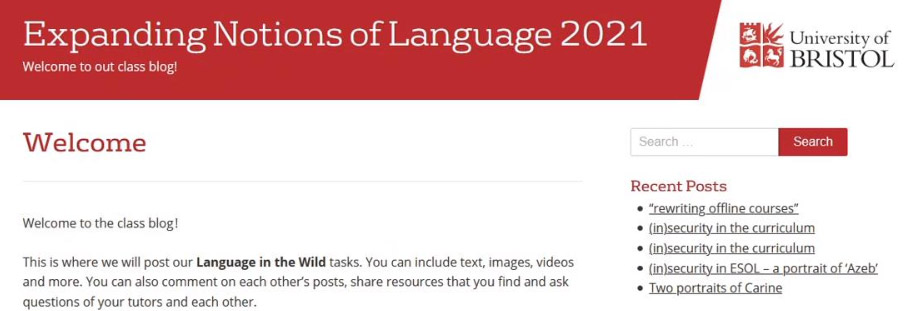Using Bristol Blogs for discussion
Origin
Language and Education, School of Education
Contact
Robert Sharples: robert.sharples@bristol.ac.uk
Tools used
Bristol Blogs – Wordpress.com

‘So much of the richness of dialogue comes from the small conversations we have in corridors and doorways and this is lost online’
Background
Discussion is a part of everything that we do. Rob was interested in dialogic learning and wanted to find a way for dialogue to help students overcome isolation and sustain engagement within his newly developed unit. This wasn’t only for students’ welfare, but also for their academic and intellectual development.
Blackboard hadn’t felt like the right tool for this project; there had been problems achieving what Rob had wanted in the VLE. Whilst completing some work with Padlet and OneNote, as well as trying out Mural, Rob felt he wanted a more secure way for students to contribute to conversation.
He needed a tool to be accessible and simple for students but also something that he felt comfortable using. The tool needed to work in an asynchronous and semi-synchronous way. Students could be writing; Rob could be responding, and students could be responding too.
Objectives
Although Rob had experimented with blogging in previous years, this was a first for this unit. The Bristol Blogs platform became a good contender to use in his teaching. It was a stable tool, that is supported by IT services, so Rob knew he could get help using it when needed. There is also a strong fence around it, with only approved users able to read or contribute to the blog. This was important because it allowed the students to contribute freely, without worrying who might later read their emerging ideas.
What was done
To begin with, students had to make an account on Bristol Blogs. Rob then added them to the unit’s space. The guidance and directions were very clear and sat within their unit handbook and Blackboard pages. A safe environment was created where Rob could tell students that no one except peers would be reading their blog contributions, which allowed the students to think and write more freely.
A task was then set for them every week. The unit is called ‘Expanding notions of language’ and it is intended to get language teachers thinking more widely about what language is. There is an emphasis on reflection, but without asking them to write reflective pieces. The students spend three weeks looking at various aspects of language, including communities, language in the family, language in social media, and language, security, and surveillance.
Rob wanted students to dig deeper into their thinking about language and develop as writers. So, asking them to write 500 words every week, and write about their roles in TESOL, enabled them to do this. It also got them writing more reflectively. The blog was a great tool for them to engage with but also developed them academically.
What worked well
- The overall feel of the project was very positive. Students commented on each other’s posts, and a dialogue built up with those who weren’t confident talking about their own languages. They had a space to discuss and really start thinking about language. This depth of thinking is something Rob had not been able to get in his in-person classes.
- Students had a safe space to work, a clear task (they just needed to complete a written piece every week ) as well as lots of guidance. As a result they were able to push the boundaries in their thinking.
- Rob saw good reflection in their writing without asking them to do reflection. It also prepared them for their assessments: some students said they had got the ideas for their assignments from writing in the blog.
Issues and considerations
- The admin behind setting up the blog was quite high. If this could be streamlined so that emails could be bulk uploaded, it would be a lot easier.
- If this were done again, course leaders could consider more what the students expect, want and need, rather than what the academics want to do with them. This is where unit evaluation becomes so valuable.
- There was a tendency for the academic to reply to all the blog posts. Rob would like to limit his replies to one or two each week to make sure the students were writing for themselves and not for him.
- Searching in the blog was difficult. This could be remedied if students could be persuaded to tag their posts consistently.
Student Feedback
Student feedback was very positive. Two thirds rated the unit ‘excellent’ (and over 92% ‘good or excellent’), with several comments specifically mentioning the blog. It was felt to be an extra channel of communication between students and with the tutor, and a useful space for students to formulate their ideas for discussion in class.
